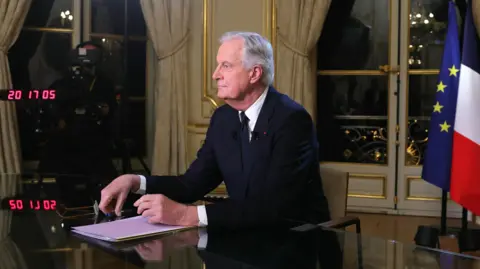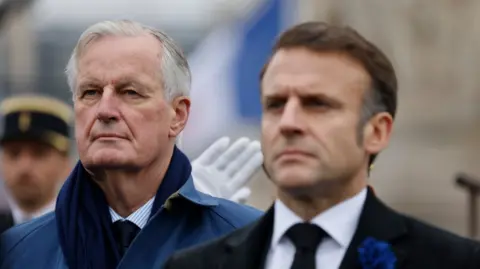French government on verge of collapse as PM faces vote
 EPA
EPAFrench Prime Minister Michel Barnier could be ousted in a no-confidence vote on Wednesday, just three months after being appointed to run the government by President Emmanuel Macron.
Opposition parties tabled the motion after the former Brexit negotiator controversially used special powers to force through his budget without a vote.
Barnier pleaded his case on French television on Tuesday night and said it was "possible" he could survive Wednesday's vote.
But opposition parties on the left and right are expected to unite to remove him, fuelling the political instability which has gripped France since summer elections produced a divided parliament, and increasing the pressure on Macron.
France has been beset by political uncertainty since snap elections in June and July called unexpectedly by Macron led to no single group having a majority in parliament.
While a left-wing alliance won most seats, Macron appointed the conservative Barnier in a bid to reinstate stability - but his government has been consistently undermined because it does not have a majority.
On Monday, Barnier opted to push through controversial reforms to social security by invoking presidential decree after failing to win enough support for the measures, a move which has left his minority government on the brink of collapse.
Speaking to French television, Barnier rejected the idea that President Emmanuel Macron should resign to unblock the country's current crisis, calling him a "guarantee of stability".
Barnier also said he remained open to budget talks with opposition parties despite being widely predicted to lose the vote, and sought to distance himself from France's ongoing state of political instability, saying he was not at fault.
In the interview with the TF1 and France 2 television channels, Barnier said: "It's not a question of political survival for me.
"I've been in this office for three months. I arrived there on 5 September, telling myself that I could leave the next morning," he added.
"This is the first time since 1958 that there is no majority at all. No majority possible between three major groups. I know that this is a fragile and ephemeral situation."
 EPA
EPAThe budget bill sought to deliver €60bn (£49bn) in tax rises and spending cuts.
Barnier was forced to cave in to changes demanded by critics due to his lack of a parliamentary majority.
He is now expected to become the shortest-lived prime minister in France's Fifth Republic, with the left wing bloc in the National Assembly, as well as the far-right, predicted to back the motion against him.
If he does not survive the vote, he will remain in place as caretaker prime minister until Macron announces a new government.
While Macron - who is on a state visit to Saudi Arabia - has reportedly begun considering his pick for the next prime minister, the process could take weeks, as it did in summer.
